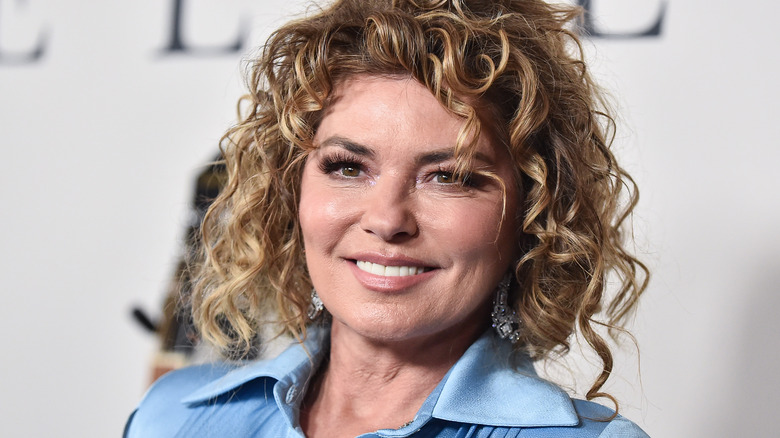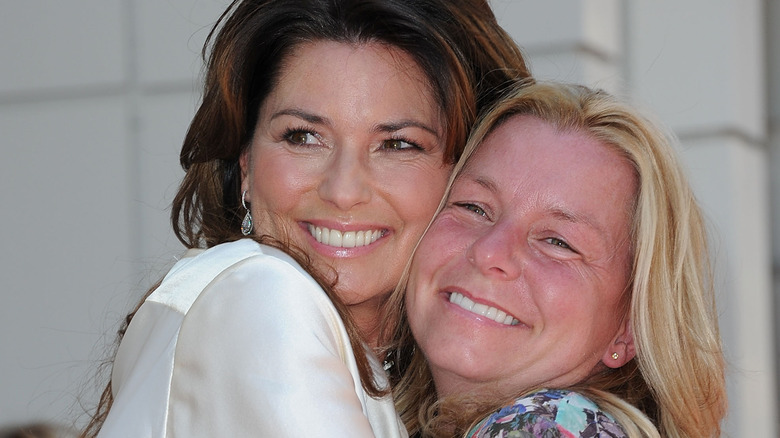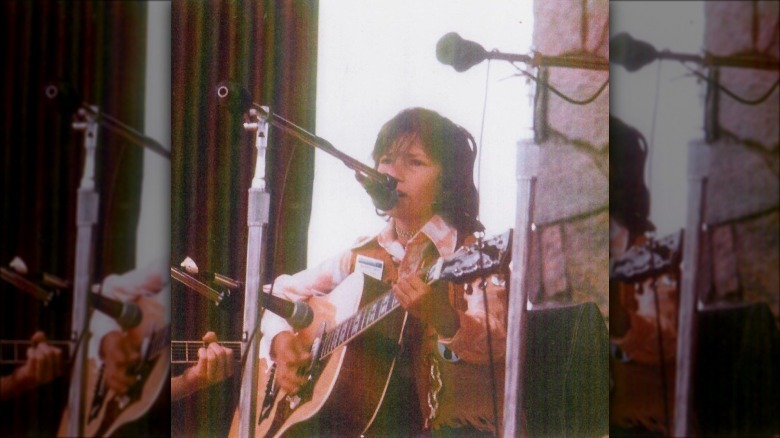How Shania Twain's Life Changed After Her Parents' Sudden Death
The following article discusses child abuse and sexual abuse.
Shania Twain had a complicated, often fraught, relationship with her parents — all three of them. Twain's last name comes from her stepfather, Jerry Twain, whom her mother, Sharon Morrison, married when she was young. The country star lost contact with her biological father after he and Morrison separated when she was 2, though he tried to paint a different picture. "It breaks my heart that she's cut me off," Clarence Edwards told the National Enquirer in the late '90s, Robin Eggar wrote in "Shania Twain: A Biography."
From then on, Shania always referred to Jerry as her father, leading to some confusion and controversy over her ethnicity as he was Native American. "My father (Twain) went out of his way to raise three daughters that weren't even his," she said in a statement, Canada's Aboriginal Multi-Media Society reported in 1996. "For me to acknowledge another man as my father ... would have hurt him terribly." But her relationship with Jerry was anything but perfect.
Shania's childhood has enough tragedy to fill a book — which happened in 2011. In "From This Moment On," she described suffering abuse at Jerry's hands, Entertainment Weekly reported. Jerry was both violent and sexually abusive. "It was terrible — you didn't want to be a girl in my house," she told The Sunday Times in 2022. Morrison left her husband for a time but returned not long after. In 1987, Jerry and Morrison died in a car accident, leaving Shania with one of her life's biggest responsibilities.
Shania Twain helped raise her siblings
When her parents died, Shania Twain was only 22. She had one older sister, who had her hands full with her own children, so the responsibility of keeping her younger siblings alive fell on Twain's shoulders. "My younger sister [pictured above] was still living at home, and my two younger brothers were still, you know, 13 and 14 years old," she said on the "Making Space with Hoda Kotb" podcast in January.
The siblings wanted to stay together and no relative could take in both minors. "The only way to keep them together was for us to stay together," she told Kotb. Twain, who had been singing in bars since childhood, found a stable singing gig at a resort in Huntsville, Ontario, and moved her siblings down there in June 1988, according to Robin Eggar. "Their family life returned to a semblance of normality," she wrote in the 2001 biography.
The extent of Twain's potential was quickly evident. But the realization made her feel trapped. "I felt exploited, but I didn't have a choice now," she told The Times. "I had to play the glamorous singer, had to wear my femininity more openly or more freely." With her past traumas still very much present, Twain felt uncomfortable embracing her body as an integral part of her stage presence. "[I had to] work out how I'm not gonna get groped, or raped by someone's eyes, you know, and feel so degraded."
Shania Twain took her parents' death hard
Shania Twain managed the responsibility while grieving the death of her parents. Even though her relationship with them had been far from perfect, they were all Twain had. "I lost a very important foundation. As rickety as it was, it was still a foundation ... so much of my life was stemming from them being in my life. The good and the bad," she said on "Making Space with Hoda Kotb." Indeed, it was her mother who had encouraged her to explore her artistic calling, even amid the poverty that ravaged the family.
Sharon Morrison recognized that her daughter's talent wasn't ordinary. "She also realized this could be our break. This could break the cycle of our lives," she told Kotb. But she also knew Twain was introverted and unwilling to make herself the center of attention. So she worked on that with her daughter. "She realized the only way that I could succeed was to be onstage."
Without her mother's incentive, Twain would probably have kept her musical talent as a personal passion that helped her get through tough times. "I wouldn't have done it by myself," she told ABC News. "I would have shied away from it. I would have shied away from my fears." Despite everything she went through with her mother and father, Twain knows they would have been proud of her. "I can guarantee you that they would be jumping for joy," she told Rolling Stone in 1998.
If you or someone you know may be the victim of child abuse, please contact the Childhelp National Child Abuse Hotline at 1-800-4-A-Child (1-800-422-4453) or contact their live chat services.
If you or anyone you know has been a victim of sexual assault, help is available. Visit the Rape, Abuse & Incest National Network website or contact RAINN's National Helpline at 1-800-656-HOPE (4673).



